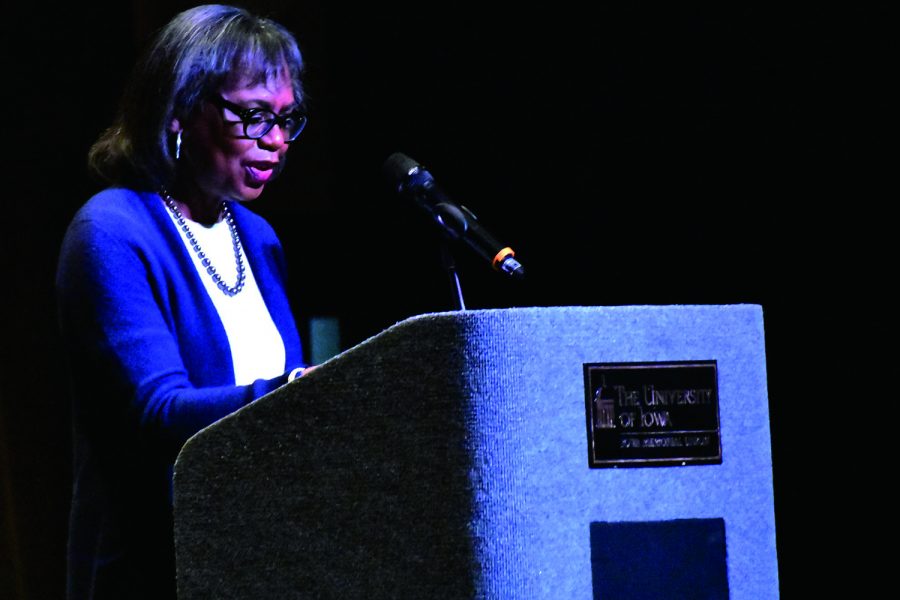Anita Hill calls on 2020 candidates to address sexual assault during University of Iowa stop
Professor Anita Hill spoke at the IMU Thursday evening, taking questions from the audience about handling sexual assault on college campuses and calling on presidential candidates to address issues of gender-based violence.
Professor Anita Hill gives a speech on sexual harassment on Thursday, January 23, 2020.
January 23, 2020
Professor Anita Hill promised herself she would speak about sexual assault for at least two years after her 1991 testimony before the U.S. Senate Judiciary Committee, hoping she would see government action on the issue by the end of that time.
Nearly 30 years later, Hill called on 2020 presidential hopefuls during a lecture at the Iowa Memorial Union to address gender-based assault.
Hill received a question from an audience member who was considering caucusing for former Vice President Joe Biden, but had concerns about the way the Democratic presidential hopeful presided over Thomas’ confirmation hearings when Biden was chair of the Senate Judiciary Committee.
During the hearings, Biden did not allow testimony from three women who also accused Thomas of sexual harassment. Although Biden called Hill to apologize in April 2019, Hill said the “statute of limitations” had passed for Biden to say sorry.
“What are you going to do today, and will you promise as leader of this country, to use all of your energy to address the problem as it happens and prevent it happening to another generation the way it has?” Hill asked. “That’s what I want to hear, not only from him, but from every one of [the presidential candidates].”
Hill delivered her lecture “From Social Movement to Social Impact: Putting an End to Sexual Assault” at the IMU on Thursday, where Hill was also presented with the University of Iowa Center for Human Rights Courage of Conviction award.
“I believe that gender violence has always been the literal and figurative foot on women’s necks,” Hill said. “If we are continually denied the authority to assert our own physical and emotional safety, how can we ever expect to challenge other restrictions?”
In 1991, Hill testified at the confirmation hearings of current U.S. Supreme Court Justice Clarence Thomas, alleging Thomas sexually harassed her when she worked with him at the Education Department and the Equal Employment Opportunity Commission. President George H.W. Bush nominated Thomas to the court.
Hill said she faced many Americans who did not believe she was sexually harassed. She expressed frustration that the #MeToo movement, which began in 2017, did not bring about any meaningful political change during the confirmation hearings for Supreme Court Justice Brett Kavanaugh, who was accused of sexual assault by a high-school classmate, psychology Professor Christine Blasey Ford.
“Even in this primary cycle, little or no attention has been given to what has been called a moment of reckoning back in 2017,” Hill said. “We have seemingly forgotten about the moment of reckoning, and candidates have not proposed plans for how they will address the issues raised in 2017 or 2018 with the Kavanaugh hearing.”
RELATED: Iowa City protesters rail against Brett Kavanaugh’s Supreme Court nomination
UI Lecture Committee member Jocelyn Roof said many college students became familiar with Hill’s 1991 testimony after Kavanaugh’s confirmation hearings.
“I, like many in my generation, first learned Professor Hill’s story while I watched Supreme Court Justice Brett Kavanaugh’s confirmation hearings,” Roof said. “When I listened to her testimony from over 25 years ago and compared it to the treatment of Dr. Christine Blasey Ford, there was a pit in my stomach.”
UI Lecture Committee Co-Chair Amy Evans said learning how to address sexual harassment is important in a campus environment.
“As students, we’re preparing to have careers, and part of having a career is understanding what sexual harassment in the workplace is — what you can do about it,” she said. “Not to mention, Professor Hill has a unique perspective not only as a victim of sexual harassment, but as one who had their credibility challenged on a national stage by our leaders.”



